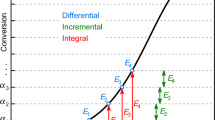Abstract
By the study of 3000 kinetic runs for all homogeneous two-step models under variation of activation and signal parameters, it has been stated that the generated Mechanistic Concentration Code (=MCC) is the best vehicle for data extraction in Thermal Analysis. It summarises the rate-controlling steps and their molecularities, independently of their activation data and (to 80–90%) of their method-specific signal parameters. Hence, an optimum evaluation needs the internal (best-fitted) reference step, the initial concentration of a reference reactant, and equal weight of theoretical and experimental results, reached using the same algorithms. Thus, the MCC of any series measured in general allows for a reliable model determination via the distribution into all two-step models, using the tools of probability and decision theory. A transfer of the strategy to heterogeneous reactions is discussed.
Zusammenfassung
Durch die Untersuchung von über 3000 kinetischen Abläufen für alle homogenkinetischen Zweistufen-Modelle wurde festgestellt, da\ der Mechanistische Konzentrations-Code (= MCC) ein optimaler Datenträger in der Thermischen Analyse ist: Er beschreibt die geschwindigkeitsbestimmenden Schritte und ihre Molekularität, unab- hängig von deren Aktivierungsdaten und, zu 80–90%, von ihren methodenspezifischen Signalparametern. Ein optimales Auswerteverfahren benötigt einen internen (optimal angepa\ten) Referenzschritt, die Startkonzentration eines Referenz-Reaktanten und Gleichberechtigung theoretischer und experimenteller Befunde, erreicht, durch Verwendung derselben Algorithmen. Allgemein ermöglicht der MCC aus einer Reihe von Experimenten dann eine Modellbestimmung über eine Verteilung, die durch entscheidungstheoretische Kriterien die Wahrscheinlichkeiten aller Zweistufenmodelle auflistet.
Eine übertragung des Verfahrens auf heterogene Prozesse wird diskutiert.
Similar content being viewed by others
References
B. Wunderlich and P. Fellner, Thermochim. Acta, 110 (1987) 67.
D. Krug, Thermochim. Acta, 10 (1974) 217.
M. Balarin, Physics Letters, 64A (1978) 435.
J. H. Flynn, J. Thermal Anal., 36 (1990) 1579.
R.K Agrawal, J. Thermal Anal., 35 (1989) 909.
W. Stiller, Arrhenius Equation and Non-equilibrium Kinetics, Eds. W. Meiling, A. Uhlmann and B. Wilhelmi, Teubner, Leipzig 1984.
E. Koch and B. Stilkerieg, Thermochim. Acta, 17 (1976) 1.
E. Koch and B. Stilkerieg, J. Thermal Anal., 17 (1979) 395.
E. Koch, Thermochim. Acta, 121 (1987) 253.
E. Koch, Theoretica Chimica Acta, submitted for publication.
E. Koch, Thermochim. Acta, 152 (1989) 387.
E. Koch, Non-isothermal Reaction Analysis, espec. Chr. 8, Academic Press, London 1977.
E. Koch, presented on Ulmer Kalorimetrietage 1991, Thermochim. Acta, in press.
T. A. Marsland and J. Schaeffer Eds., Computers, Chess and Cognition, Springer, New York 1990.
E. Koch and Zs. Nagy-Ungvárai, Ber. Bunsen. Ges. Phys. Chem., 191 (1987) 1375.
J. H. Flynn, M. Brown and J. šestak, Thermochim. Acta, 110 (1987) 101.
J. H. Flynn, M. Brown, E. Segal and J. Sestak, Thermochim. Acta, 148 (1989) 45.
R. Carnap and W. Stegmüller, Deduktive Logik und Wahrscheinlichkeit, Springer, Wien 1959.
K. R Popper, The Logik and Scientific Discovery, Hutchinson of London, 1974.
J. šestak and G. Berggren, Thermochim. Acta, 3 (1971) 1.
J. šestak, J. Thermal Anal., 33 (1988) 1263.
P. D. Garn, Thermochim. Acta, 160 (1990) 135.
S. S. Vyazovkin, V. I. Goryachko and A. I. Lesnikovich, Thermochim. Acta, 176 (1991) 49.
E. Koch, Angew. Chem., 95 (1983) 185; Int. Ed. Engl., 22 (1982) 225.
W. F. Hemminger and H. K. Cammenga, Methoden der thermischen Analyse, Springer, Berlin 1989.
Author information
Authors and Affiliations
Rights and permissions
About this article
Cite this article
Koch, E. Experimentally available kinetic codes as a tool for promising data extraction in thermal analysis. Journal of Thermal Analysis 38, 289–294 (1992). https://doi.org/10.1007/BF01915493
Issue Date:
DOI: https://doi.org/10.1007/BF01915493




